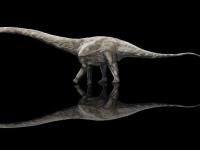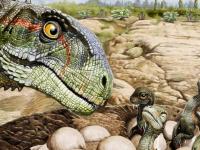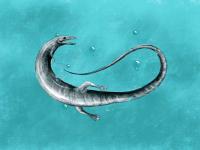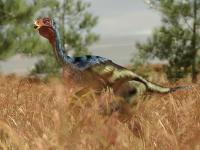Farting Dinosaurs With Low Sex Drives 'ATE Themselves Into Extinction'
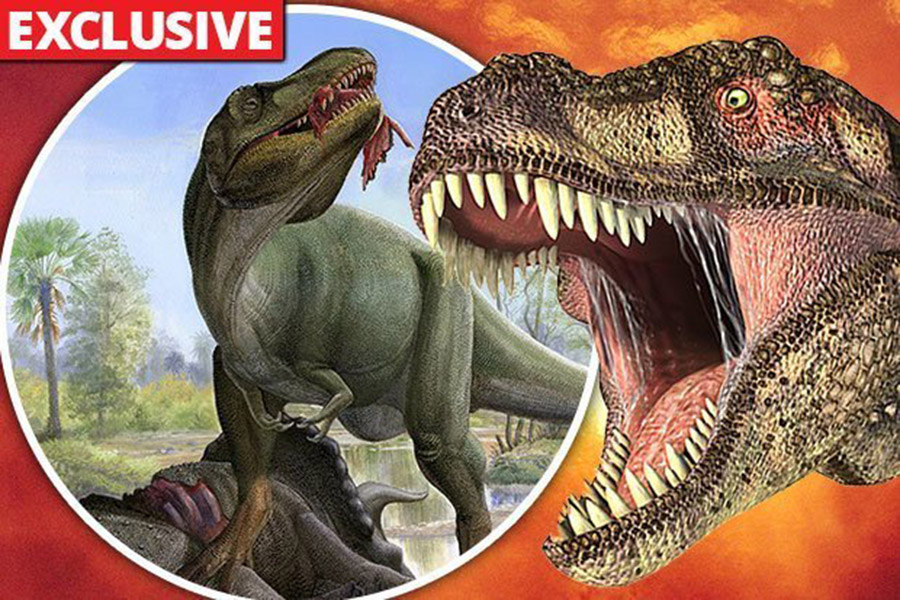
THEORIES for the dinosaurs’ extinction generally revolve around the impact of a large extraterrestrial object 65 million years ago. But there are other explanations…
Entomologist Stanley Flanders, for example, blamed caterpillars. He theorised the emergence of the first moths and butterflies would have had a huge impact on Cretaceous era vegetation.
With no defence against the new creatures, plants would have been denuded of leaves very dramatically. And as dinosaurs didn't wear jumpers – as far as we know – the moths had nothing else to eat.
According to Dr Flanders’s paper "Did the Caterpillar Exterminate the Giant Reptile?” the giant plant-eating dinosaurs were dependent on eating huge quantities of vegetation daily to sustain their massive bulk, and when the moths and butterflies – or more specifically their caterpillars and grubs – stripped the plants of their leaves, the dinos were left starving.
And once the plant-eaters’ numbers fell, the meat-eaters would have nothing to chow down on but each other.
In time, of course, birds – those lightweight cousins of the dinosaurs – would come to prey on the new order of bug but for a generation or so there would be nothing keeping the caterpillars down.
"Thus," Flanders wrote, "the giant reptiles which had survived during eons characterised by great changes in climate, continental uplifts, and different diets, may have been exterminated by the lowly caterpillar."

Yale University palaeontologist George Wieland was one of the first scientists to offer a theory about the extinction of the dinosaurs. He thought it was all to do with eggs.
Based on ideas from a couple of pioneering Victorian palaeontologists, Wieland wrote that there emergence of smaller, faster, animals that raided the nests of Triceratops and her cousins for tasty and nutritious eggs.
Because the dinosaurs were huge animals that reached sexual maturity much more slowly than the piratical little mammals that were swiping their eggs, dinosaurs just couldn’t adapt to the threat in time to save themselves.
Baron Franz Nopcsa von Felső-Szilvás was an aristocrat, and adventurer and possibly a spy as well as a pioneer of palaeontology. He was one of the first scientists to suggest that dinosaurs cared for their young, as well as identifying the relationship of birds to dinosaurs.
He was an eccentric genius, notably naming one prehistoric species of turtle that he discovered after his boyfriend’s arse, but his theories about the end of the dinosaurs were his most eccentric of all. As well as speculation about the size of gigantic beasts’ pituitary glands, he developed a theory that dinosaurs – like pandas today – just lost interest in sex.
The History Channel documentary Ancient Aliens had an even more offbeat reason for the end of the age of the dinosaurs. And it had to do with, surprise surprise, ancient aliens.
In the show, guest Jason Martell implies that dinosaurs were created by aliens in the first place, saying that we don’t know where they came from in the first place. The idea is echoed by Giorgio Tsoukalos who suggests that the 150 million year reign of the dinosaurs was an ‘experiment’ by these apparently very patient aliens who eventually tired on their saurian proteges and wiped them out.
There’s also some fascinating, if ultimately fairly daft speculation about human and dinosaurs co-existing. In fact, there’s a gap of some 60 million years between them an dinos, in which a variety of other fascinating but lesser-known animals plied their trade apparently without the oversight of mystery space travellers.
Of course, many species survived from the age of the dinosaurs completely intact. Tsoukalos rather brilliantly theorises that “I think it is possible that the coelacanth survived due to a direct guarantee by extraterrestrials.”
The show concludes that because a large number of dinosaur fossils are slightly radioactive that’s evidence that the monstrous beasts were taken out with a massive nuclear strike from an alien spacecraft. Which could be true, but the fact that many dinosaur fossils are found in sediments rich with carnotite – a naturally uranium-bearing ore – might be another explanation for that.
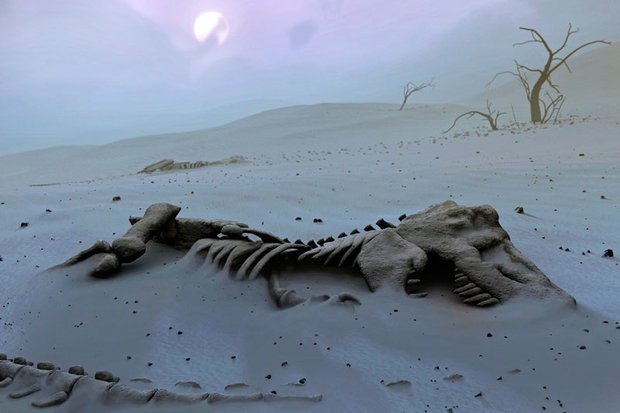
Still, the intervention of little black-eyed men from other planets isn’t the best or most educational theory for the end of the age of dinosaurs. We’ve saved that for last. It is, of course, farts.
All we know about dinosaur behaviour and physiology and behaviour is derived from a relatively small sample of individuals that happens have become fossilised, and even then large parts of their bodies have not survived.
Plant-easing dinosaurs seem, in many cases, to have teeth that simply weren’t up to the job of grinding the huge quantities of vegetable matter required to support their colossal bulk.
For a while, it was theories that they deliberately swallowed stones that would help break down the fibrous planet once they were in there stomachs.
Then researchers David Wilkinson, Euan Nisbet and Graeme Ruxton suggested that perhaps the huge beats were hosts to thriving colonies of microorganisms that digested the material on the sauropods’ behalf.
Only problem with that is, they would have generated colossal amounts of methane as a by-product. That is to say, farts.
Since we know similar emissions from cows and other livestock contribute greenhouse gases to our warming atmosphere today, Wilkinson and his team started to wonder what those epic Apatosaurus, Diplodocus and Barosaurus trumps would have done to the climate of their era.
Guessing that a square kilometre would be home to roughly 10 big plant-eating dinosaurs, and scaling that population up to approximately half the available land area at the time, Wilkinson and his pals theorised that that the giant, long-necked dinosaurs could have produced up to 520 million metric tons of fart gas a year.
That might have helped keep the mighty beasts warm – but did it contribute to runaway climate change that saw them off?
Maybe yes, maybe no. But it’s a handy reminder that our comparatively short tenure on this planet could soon end unless we get a control on our own emissions. And that doesn’t just mean farts.

Original story on www.dailystar.co.uk




